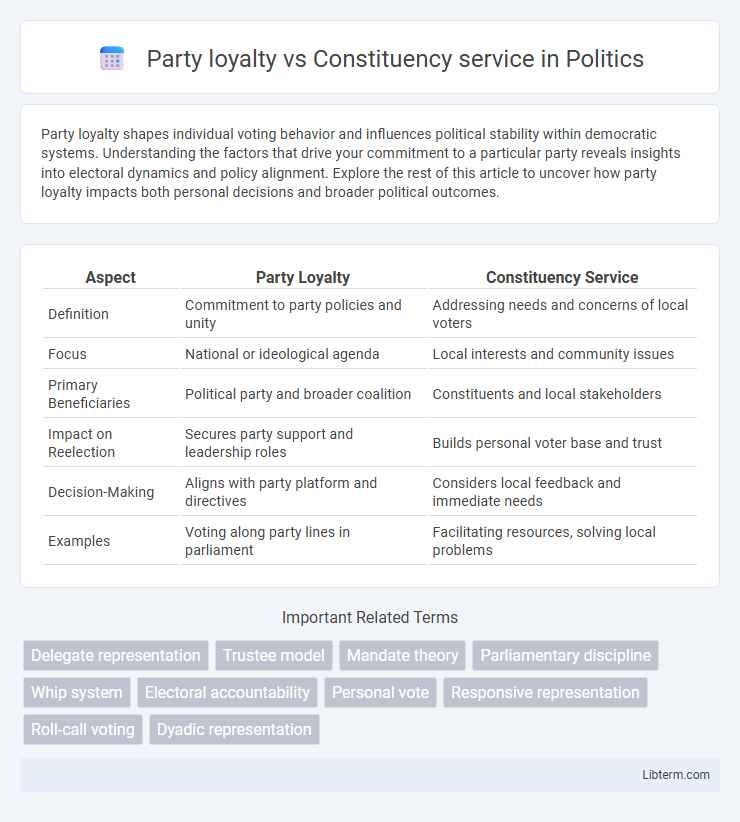Party loyalty shapes individual voting behavior and influences political stability within democratic systems. Understanding the factors that drive your commitment to a particular party reveals insights into electoral dynamics and policy alignment. Explore the rest of this article to uncover how party loyalty impacts both personal decisions and broader political outcomes.
Table of Comparison
| Aspect | Party Loyalty | Constituency Service |
|---|---|---|
| Definition | Commitment to party policies and unity | Addressing needs and concerns of local voters |
| Focus | National or ideological agenda | Local interests and community issues |
| Primary Beneficiaries | Political party and broader coalition | Constituents and local stakeholders |
| Impact on Reelection | Secures party support and leadership roles | Builds personal voter base and trust |
| Decision-Making | Aligns with party platform and directives | Considers local feedback and immediate needs |
| Examples | Voting along party lines in parliament | Facilitating resources, solving local problems |
Defining Party Loyalty in Modern Politics
Party loyalty in modern politics refers to the consistent support and adherence of elected officials to their political party's platform, policies, and leadership directives. It plays a crucial role in maintaining party cohesion, influencing legislative behavior, and securing voting blocs in parliamentary systems. This loyalty often shapes politicians' decision-making processes, balancing ideological commitment against the demands of constituency service.
Understanding Constituency Service
Constituency service involves elected officials directly addressing the specific needs and concerns of their constituents, often providing personalized assistance with government agencies, securing local funding, or advocating for community projects. This hands-on approach strengthens voter trust and local support by demonstrating tangible benefits and responsiveness. Understanding constituency service is crucial as it balances the broader goals of party loyalty with the immediate, localized demands of the electorate.
Historical Evolution of Party Allegiance
The historical evolution of party allegiance reveals a shift from strong, ideologically driven loyalty to increasing emphasis on constituency service as politicians respond to local voter needs. Early party systems, particularly in the 19th century, were characterized by rigid partisan loyalty tied to clear philosophical divides and patronage networks. Over time, the rise of candidate-centered politics and increased voter demand for direct local representation fostered a decline in strict party allegiance, highlighting a balancing act between national party platforms and personalized constituency engagement.
The Role of Representatives: Party or People?
Representatives must balance party loyalty with constituency service to effectively serve both political objectives and voter interests, navigating pressures from party leadership while addressing local needs. Party loyalty often dictates adherence to legislative agendas and voting blocs, ensuring cohesion and strategic advantage in governance. Constituency service emphasizes direct engagement with voters, prioritizing community-specific issues and responsiveness that fosters trust and electoral support.
Benefits and Drawbacks of Party Loyalty
Party loyalty ensures cohesive policymaking and strengthens party unity, enabling politicians to advance a consistent legislative agenda and maintain voter trust within their political base. However, strict adherence to party lines can hinder representation of diverse constituent interests and reduce politicians' flexibility to address local needs effectively. Dependence on party loyalty may also limit bipartisan cooperation and deepen political polarization in the legislative process.
Advantages and Challenges of Constituency Service
Constituency service fosters stronger voter relationships by addressing local needs, improving public trust and electoral support for legislators. It offers tangible benefits such as personalized assistance with government programs, which enhances community well-being and responsiveness. Challenges include potential resource strain and balancing local interests with broader party agendas, creating tensions in political priorities.
Case Studies: Notable Political Dilemmas
Notable political dilemmas often emerge when elected officials face conflicts between party loyalty and constituency service, as exemplified by the 2010 U.S. Congress Tea Party rebellion where Republican legislators challenged party leadership to better represent their district's anti-establishment voters. Similarly, UK MPs frequently navigate tensions during critical Brexit votes, balancing constituency preferences with party mandates, leading to dramatic rebellions and reshuffled alliances. These case studies underscore the strategic trade-offs politicians make to maintain electoral support while aligning with party agendas.
Impact of Party Loyalty on Policy Decisions
Party loyalty often shapes policy decisions by aligning legislators with their party's platform, ensuring cohesive voting patterns and strategic legislative support. This alignment can prioritize party agendas over local constituency needs, potentially limiting responsiveness to diverse voter interests. Strong party loyalty reinforces ideological consistency but may reduce flexibility in addressing specific constituent concerns, affecting the balance between national objectives and local representation.
Constituency Service and Electoral Success
Constituency service plays a critical role in electoral success by directly addressing voter needs and fostering personal trust, which enhances candidate appeal beyond party lines. Effective constituency engagement--including problem-solving, local advocacy, and personalized communication--increases voter loyalty and turnout, often proving decisive in tightly contested elections. Research shows politicians with strong constituency service records consistently outperform counterparts who rely solely on party loyalty, highlighting its strategic importance in competitive electoral environments.
Striking a Balance: Lessons for Politicians
Striking a balance between party loyalty and constituency service is crucial for politicians to maintain effective representation and secure reelection. Prioritizing constituency needs fosters trust and responsiveness, while adherence to party platforms ensures legislative cohesion and policy influence. Successful politicians navigate this tension by aligning local interests with party goals, leveraging communication and negotiation skills to satisfy both demands.
Party loyalty Infographic

 libterm.com
libterm.com